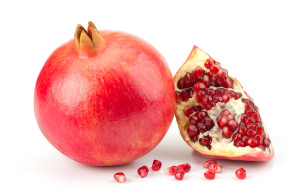Written by Greg Arnold, DC, CSCS. Thirty days of supplementation with 1000 mg of pomegranate extract significantly improved blood glucose and cholesterol levels and decreased levels of inflammation and oxidative cell damage in obese study participants.
 For the 300 million “clinically obese” people worldwide 1, the numerous health problems such as cardiovascular disease, type 2 diabetes, hypertension, dyslipidemia, respiratory disorders and cancers that accompany their obesity 2 are due to increased cell damage (“oxidative stress”) and inflammation levels 3. Findings ways to improve inflammation levels in obese subjects may help minimize the onset of the chronic health problems that accompany obesity.
For the 300 million “clinically obese” people worldwide 1, the numerous health problems such as cardiovascular disease, type 2 diabetes, hypertension, dyslipidemia, respiratory disorders and cancers that accompany their obesity 2 are due to increased cell damage (“oxidative stress”) and inflammation levels 3. Findings ways to improve inflammation levels in obese subjects may help minimize the onset of the chronic health problems that accompany obesity.
In a 2016 study 4, 42 obese male and female adults, 31 – 60 years of age and with an average body mass index of 31.8 kg/m2), were given 1,000 milligrams of pomegranate extract (21 subjects) or placebo (21 subjects) per day for 30 days. Before and after the study, blood samples were obtained to measure levels of inflammation as well as blood sugar and cholesterol levels.
The researchers noted several significant benefits in the pomegranate group. They saw statistically significant decreases in cell damage levels (“MDA”) and two inflammatory proteins compared to the placebo group:
| Pomegranate | Placebo | p – value between groups | |
|---|---|---|---|
| MDA | 36.4% decrease (3.3 to 2.1) | No change (3.4 to 3.4) | < 0.0001 |
| hs-CRP (mg/L) | 40.6% decrease (5.1 to 3.03) | 5.7% increase (5.2 to 5.5) | < 0.0001 |
| IL-6 (pg/mL) | 24.8% decrease (10.9 to 8.2) | 1.8% decrease (11.3 to 11.1) | < 0.0001 |
They also noted significant improvements for blood sugar control and cholesterol levels:
| Pomegranate | Placebo | p – value between groups | |
|---|---|---|---|
| Glucose (mg/dL) | 5.5% decrease (98.6 to 93.2) | 1.7% increase (99.6 to 101.3) | < 0.0001 |
| Insulin (microIU/mL) | 37.1% decrease (9.7 to 6.1) | 1% increase (9.1 to 9.2) | < 0.0001 |
| HOMA-IR | 41.7% decrease (2.4 to 1.4) | 4.3% increase (2.3 to 2.4) | < 0.0001 |
| Total cholesterol (mg/dL) | 7.7% decrease (205.5 to 189.8) | 0.6% increase (218.5 to 219.9) | < 0.0001 |
| LDL Cholesterol (mg/dL) | 10.1% decrease (110.7 to 99.6) | 0.7% increase (114.7 to 115.6) | < 0.0001 |
| HDL cholesterol (mg/dL) | 6.7% increase (46.4 to 49.5) | 1.5% decrease (49.4 to 48.7) | < 0.000 |
| Triglyceride (mg/dL) | 20.2% decrease (178.3 to 142.4) | 1.5% increase (164 to 166.5) | < 0.0001 |
Citing the high levels of antioxidants in pomegranate extract as a probable reason for these results, especially “hydrolyzable tannins, anthocyanins and ellagic acid derivatives” 5, the researchers concluded that these results “all emphasize the beneficial effect of pomegranate in reducing risk for people with overweight and obesity.”
Source: Hosseini, Banafshe, et al. “Effects of pomegranate extract supplementation on inflammation in overweight and obese individuals: A randomized controlled clinical trial.” Complementary therapies in clinical practice 22 (2016): 44-50.
© 2015 Elsevier Ltd. All rights reserved.
Posted May 30, 2017.
Greg Arnold is a Chiropractic Physician practicing in Hauppauge, NY. You can contact Dr. Arnold directly by emailing him at PitchingDoc@msn.com or visiting his web site at www.PitchingDoc.com.
References:
- WHO. Obesity and Overweight. 2016; Fact Sheet on Overweight and Obesity. Available at: http://www.who.int/mediacentre/factsheets/fs311/en/. Accessed May 19, 2017, 2017.
- Stelzer I, Zelzer S, Raggam RB, et al. Link between leptin and interleukin-6 levels in the initial phase of obesity related inflammation. Translational Research. 2012;159(2):118-124.
- Gupta D, B Krueger C, Lastra G. Over-nutrition, obesity and insulin resistance in the development of β-cell dysfunction. Current Diabetes Reviews. 2012;8(2):76-83.
- Hosseini B, Saedisomeolia A, Wood LG, Yaseri M, Tavasoli S. Effects of pomegranate extract supplementation on inflammation in overweight and obese individuals: A randomized controlled clinical trial. Complementary therapies in clinical practice. 2016;22:44-50.
- Sohrab G, Nasrollahzadeh J, Zand H, Amiri Z, Tohidi M, Kimiagar M. Effects of pomegranate juice consumption on inflammatory markers in patients with type 2 diabetes: A randomized, placebo-controlled trial. Journal of Research in Medical Sciences. 2014;19(3).
